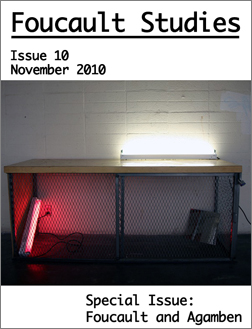Violence and the Biopolitics of Modernity
DOI:
https://doi.org/10.22439/fs.v0i10.3122Resumé
The paper studies the relationship between political violence and biological life in the thought of Hannah Arendt, Giorgio Agamben and Michel Foucault. I follow Foucault in arguing that understanding political violence in modernity means rethinking the ontological boundary between biological and political life that has fundamentally ordered the Western tradition of political thought. I show that while Arendt, Agamben and Foucault all see the merging of the categories of life and politics as the key problem of Modernity, they understand this problem in crucially different terms and suggest different solutions to it. This results in different understandings of the relationship between violence and the political. It is my contention that the violence of modern biopolitical societies is not due to originary ties between sovereign power and biopower, as Agamben claims. Sovereign states use biopolitical methods of violence, but this violence is not an originary or necessary aspect of political power. In order to criticise the forms of violence specific to modern biopolitical societies we must expose the points of tension, as well as of overlap between two types of power – biopower and sovereign power. Understanding their distinctive rationalities is crucial for developing effective strategies against current forms of political violence.Downloads
Publiceret
2010-11-01
Citation/Eksport
Oksala, J. (2010). Violence and the Biopolitics of Modernity. Foucault Studies, (10), 23–43. https://doi.org/10.22439/fs.v0i10.3122
Nummer
Sektion
Special Issue on Foucault and Agamben
Licens
Authors retain copyright to their work, but assign the right of the first publication to Foucault Studies. The work is subject to a CC BY-NC-ND 4.0 license, but despite these restrictions, authors can take for granted that Foucault Studies will permit articles published in Foucault Studies to be translated or reprinted in another format such as a book providing a full reference is made to Foucault Studies as the original place of publication.



